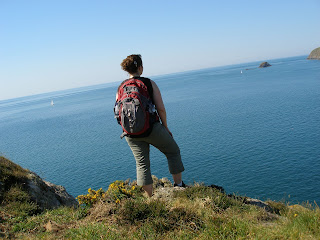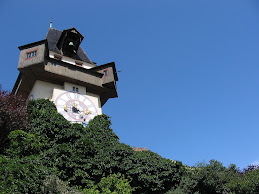 Final lesson
Final lesson
I figure it’s about time I update you on what’s going on around here, since my blog isn’t quite up-to-date. …As my last entry on Wales took place at the end of May/beginning of June, we’ve got a little catching up to do.
Most of you probably know that I’m writing this little update from Malta. But for those of you who are saying, “Mal-where?” I can fill you in.
My contract renewal as a second-year Fulbright English teaching assistant ran up at the end of May. Since TAs are only allowed to stay 2 years max, that’s it for me.
It’s a shame, really. It was pretty much the best job ever—great hours, creative freedom, and little responsibility, all rolled into one nice little package. This past school year, TAs taught at a comfortable pace of 13 lesson hours per week, which again meant only a 3- or 4-day workweek, depending on the school. Whereas last year I was quite the ace at lesson planning—I chose relevant cultural or linguistic topics and spent hours and hours creating a nice, neat, 50-minute lesson based around said topic—this year I realized that I can pull of the same result with only a fraction of the effort. In other words: I got lazy. I still came up with some great lessons this year—lessons that I’ve done countless times and leave the kids asking for more such lessons—but I didn’t put in nearly as many hours with the lesson planning. Maybe this isn’t laziness, but rather the effortlessness that comes with experience…at any rate, I discovered that I could even enter the classroom and come up with a spontaneous lesson if needed. It’s a handy dandy skill to have, but it still leaves you with the feeling that you just crammed for your final exams and pulled it off. (…Like I did for pretty much every exam I ever had in high school or college…)
One of the things I came to appreciate most about my job was the fresh start, every day. In an office job, you can have a crappy day and it just stays crappy until your 8(+) hours are up and you can finally drag yourself home tired, stressed, and frustrated. But teaching is wonderful—every 50 minutes you have the chance to start over. It’s like every 50 minutes is a new day—the slate is wiped clean and you can start over without any of the baggage from the previous lesson. If you have one crappy lesson, your minutes are numbered. Soon you can start fresh, a new beginning with a new class. I became so thankful for this…it means that your day can always get better. You’re not necessarily stuck with what you start with.
I also realized that I really liked being in the classroom. I’ve said this before, but I mean it. After two years, I can really see myself continuing to teach. And since I’m at a crossroads in my career/life, it’s the path I want to pursue the most.
Right now, all of my options are open. People keep telling me how great this is, and I sure hope they’re right. So as of now, here’s the skinny on where I am, what I’m doing, and where I may or may not be going.
After finishing up the school year, I traveled to England and Wales, came back to Graz for a bit, and then went to Serbia to visit a friend. A few days after getting back from Serbia, I completed a lifeguard training course (and got certified as a lifeguard “helper,” which I suppose means that I could “help” you not to drown) in preparation for my summer job as…drum roll please… an English teacher at a summer camp. In Malta! (…and Austria, but let’s just say Malta for now—it’s more exciting that way.)
So right now I find myself on Malta in a town called Mellieha up in the north part of the main island (conveniently called Malta as well) for three weeks with the kiddies. We’ve got a group of teenagers here between the ages of 13-18, and when we’re not in English class, or doing any number of activities designed to distract them from going out and drinking while we’re not looking, I am usually trying to sleep. So it’s a busy schedule, but pretty good so far. I’ll fill you in later, after I get back. After my 3 weeks in Malta, I’ve got a week off and then one final week with the camp in Murau, in Austria.
As it stands, I don’t know where I’ll be in September. I have a job promoting coffee machines (i.e., being the girl who gives out the free samples in a place like Best Buy and trying to get you to buy the machine) if I want it, but I still have to see if the paperwork for a working visa is approved. If so, I’ll stay in Austria for the time being. If not, I’ll come home. I’ve also applied to an agency that places teachers in private schools, but since it’s so late, it’s highly unlikely that I’d get a position for the upcoming school year (since I’d be coming back to the States after it begins, for one…), so chances are I have an in-between year anyhow. The way I see it now, if I have to have a crap job, at this point I’d rather have one in Austria than in the States…but we’ll see.
I booked a flight home for September 18 until October 13. If I’ve got something worked out in Austria by then, I’ll go back. If not, I’ll just stay. Or at least, that’s the plan.
…Stay tuned for more travel and cultural observations, coming soon!
 School's out!
School's out!

























